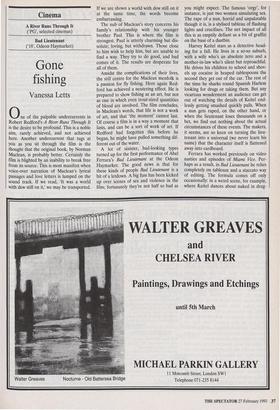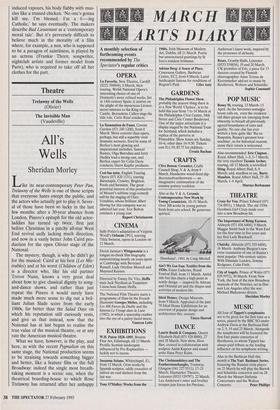Cinema
A River Runs Through It (`PO', selected cinemas) Bad Lieutenant (`18', Odeon Haymarket)
Gone fishing
Vanessa Letts
One of the palpable undercurrents in Robert Redford's A River Runs Through It is the desire to be profound. This is a noble aim, rarely achieved, and not achieved here. Another undercurrent that tugs at you as you sit through the film is the thought that the original book, by Norman Maclean, is probably better. Certainly the film is blighted by an inability to break free from its source. This is most manifest when voice-over narration of Maclean's lyrical passages and love letters is lumped on the sound track. If we read, 'It was a world with dew still on it,' we may be transported.
If we are shown a world with dew still on it at the same time, the words become embarrassing.
The nub of Maclean's story concerns his family's relationship with his younger brother Paul. This is where the film is strongest. Paul is utterly charming but dis- solute; loving, but withdrawn. Those close to him wish to help him, but are unable to find a way. They try to do good, and bad comes of it. The results are desperate for all of them.
Amidst the complications of their lives, the still centre for the Maclean menfolk is a passion for fly fishing. Here again Red- ford has achieved a neutering effect. He is prepared to show fishing as an art, but not as one in which even trout-sized quantities of blood are involved. The film concludes, in Maclean's words, that life is not a work of art, and that 'the moment' cannot last. Of course a film is in a way a moment that lasts, and can be a sort of work of art. If Redford had forgotten this before he began, he might have pulled something dif- ferent out of the water.
A lot of sinister, bad-looking types turned up for the first performance of Abel Ferrara's Bad Lieutenant at the Odeon Haymarket. The good news is that for these kinds of people Bad Lieutenant is a bit of a letdown. A big fuss has been kicked up over scenes of sex and violence in the film; fortunately they're not half so bad as you might expect. The famous 'orgy', for instance, is just two women simulating sex. The rape of a nun, horrid and unpalatable though it is, is a stylised tableau of flashing lights and crucifixes. The net impact of all this is as emptily defiant as a bit of graffiti on the base of a dustbin.
Harvey Keitel stars as a detective head- ing for a fall. He lives in a so-so suburb, with a wife who's an absolute zero and a mother-in-law who's silent but reproachful. He drives his children to school and shov- els up cocaine in heaped tablespoons the second they get out of the car. The rest of the time he sharks round Spanish Harlem looking for drugs or taking them. But any vicarious wonderment an audience can get out of watching the details of Keitel end- lessly getting smashed quickly palls. When a nun gets raped, on the other hand, or when the lieutenant loses thousands on a bet, we find out nothing about the actual circumstances of these events. The makers, it seems, are so keen on turning the lieu- tenant into a universal (we never learn his name) that the character itself is flattened away into cardboard.
Ferrara has worked previously on video nasties and episodes of Miami Vice. Per- haps as a result, in Bad Lieutenant he relies completely on tableaux and a staccato way of editing. The formula comes off only occasionally: in a weird scene, for example, where Keitel dances about naked in drug- induced vapours, his body flabby with mus- cles like a trussed chicken. 'No one's gonna kill me. I'm blessed. I'm a f—ing Catholic,' he says eventually. The makers describe Bad Lieutenant as a 'contemporary moral tale'. But it's perversely difficult to believe much in the morality of a film where, for example, a nun, who is supposed to be a paragon of saintliness, is played by an actress (Frankie Thorn, songwriter, nightclub artiste and former model from Paris), who is required to take off all her clothes for the part.



















































 Previous page
Previous page